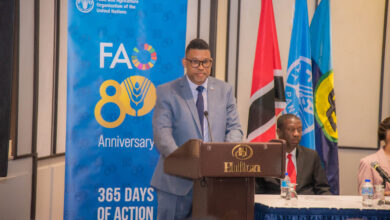(CARICOM Secretariat, Turkeyen, Greater Georgetown, Guyana) Madame Chairperson, Secretary-General of the CARICOM, Ambassador Irwin LaRocque, Project Director, Regional Statistics, Dr. Philomen Harrison, His Excellency, the Ambassador of the Delegation of the European Union in Guyana, Members of staff of the CARICOM Secretariat, members of the media, other staff and invited guests
First of all permit me to congratulate the Secretary-General Irwin LaRocque of CARICOM and the Project Director, Regional Statistics Dr. Philomen Harrison for the mounting of this event, today Wednesday 6th March, which marks the global launch and observance of the ‘Official Year of Statistics 2013’. Before proceeding, allow me to offer regrets on behalf of the Hon. Minister of Finance, Dr. Ashni Singh, who has the portfolio responsibility for National statistics, for being unable to be here this morning due to other previously planned and committed engagements. The Hon. Minister looks forward to being associated with other public events to observe the International Year of Statistics that will be scheduled throughout the year, given his unswerving commitment to the continuous development of quality statistics both by the Bureau and throughout our national statistical system.
Most of us, from the individual right up to the Regional Organisational levels have failed to grasp the importance/reality of the steadily growing momentum of Statistics in most aspects of our individual and professional lives. That recent momentum commenced with the first CARICOM Statistics Day in October 2009, which at the level of the Standing Committee of Caribbean Statisticians was so planned to be a precursor of the wider global event one year later, the celebration of the first World Statistics Day in October 2010, under the auspices of the United Nations Statistics Division. So successful was the latter event that at the 2012 Meeting of the UN Statistical Commission, the highest decision-making body for global statistics the Resolution was unanimously carried for the sustainability of the observance of a World Statistics Day, and for the said event to be held at an interval of once every five (5) years, the next such Commemoration being due in October 2015.
For both the practitioners of Statistics, the users of Statistics and those on the periphery who are consciously aware of the benefits of national, regional and global Statistics, successful as the regional (CARICOM) and Global (World) Statistics days have been, Statistics globally are now too dominant, too large, to be observed, by just a single day’s (more practically a week’s celebration).
The stepping up therefore of dedicating a whole year, rather than a day, to the observance and celebration of Statistics, was inevitable.
For those of us who have just returned from the annual Meeting of the UN Statistical Commission, which concluded last Friday, 1st March at UN Headquarters, the meeting on the International Year of Statistics 2013 was one of the complementary events. Importantly, whereas the World Statistics Day was organized and celebrated under the aegis of the United Nations Statistical Division, and driven by the national Statistical Offices throughout the World, the conviction that there needs to be a sustained momentum for the global spread and embracing statistics by all levels within our societies has spread beyond the umbrella of the United Nations Statistical Division to the extent that the Organizing Group for this International Year of Statistics comprise no less renowned Organizations such as the Royal Statistical Society, the International Biometric Society, the American Statistical Association and the Institute for Mathematical Statistics supported by hundreds of other Statistical Societies such as the International Association for Official Statistics, and national statistics offices globally.
STATISTICS IN EVERY DAY LIFE: LET US EDUCATE AND APPRECIATE
The Objective of the ‘Year of Statistics 2013’ is to promote Statistics, both as an enhanced source of knowledge as well as a comfortable and practical tool in our everyday lives. It must no longer be something abstract to most or viewed as something so hard to grasp and understand. It affects us in our everyday lives from weather forecasts, to predicting areas for high crime activity, to emergency preparedness (I always recall the floods of 2005 when the Bureau was deluged by organizations from Government to NGOs to foreign embassies for everything available on population by area that we could provide) – to name a few. Proficiency in statistics provides the art of telling a story with numerical data and thus will always be a big plus for our media practitioners. Early exposure to and comfort with Statistics among our school-age population has to be one of the major activities of the Year of Statistics. There can be no greater incentive for Statistics as a career, when in this era of continued global economic slowdown marked by both loss of/and difficulty in obtaining jobs, the global statistical community has forecast that the demand for statisticians and data analysts is expected to increase by 4.4 million jobs worldwide in the years ahead. As an educational and learning tool, the Bureau, like some other National Statistics Offices in CARICOM intends to utilize the dissemination of its preliminary Census results later this year as a first step of bringing information back to communities, back to households, back to individuals and teaching how the understanding of and utilization of statistical data can empower each one of us in our daily lives.
I leave you with that most optimistic forecast for career opportunities in Statistics so that those following us in the field of Statistics will be the first level of beneficiaries right here in our region and by extension through their advocacies, their own households, the education system and our societies at large within this region will be the ultimate beneficiaries.
I thank you.





